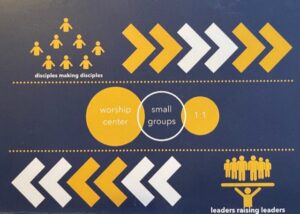Why Plant?
Our Pursuit

To follow the Great Commandment to love the Lord our God with everything and love our neighbor (Mark 12:30-31). We believe this is done when you KNOW, LOVE, and SERVE Jesus and our neighbor!
KNOW
To recognize and be in right relationship with God and others.
LOVE
To esteem, pursue, and walk with God and others.
SERVE
To go and give to God and others.
But How?
“And He put all things under His feet and gave Him as head over all things to the church, which is His body, the fullness of Him who fills all in all.” – Ephesians 1:22-23
What an amazing verse! The church, His body, the FULLNESS of Christ, Who FILLS… ALL with everything and ALL! So often we focus on the organization, the buildings, the methodology but the body of Christ, the church, is SO full of everything and anything we could ever want or desire because it is full of Christ. He is the FILLER, Who is the Way, the Truth, and the Life. We believe that our call is to make disciples of Jesus Christ that they might Know, Love, and Serve Him alone and He would FILL them with His love and life. But how do we make disciples?
Does it happen during our weekend services where we gather to hear the Word and serve one another? Or perhaps it occurs at a little smaller circle circle of our small groups, studying Gods word, praying for one another, serving with one another. Or perhaps it’s a smaller circle yet. A table for two where relationships go deep and hearts are shared, sin is confronted and love is strong. The answer is: YES, YES, YES!
Discipleship happens by the power of Christ working powerfully within His people in all three of these circles or tables. We want to each be engaged in the mission of Jesus using the gifts that we have been given to build one another up and actually make disciples as our Lord told us to do.
To do what He did!
Why a Table?

For the first 350 years of Christianity, followers of Jesus gathered in homes. There were no church buildings. Until Constantine came into the picture and made Christianity the official Roman religion (not all good), Christians views their homes as their primary place of worship and fellowship. In fact, the central picture for the gathering was not the stage or the pulpit, it was the table. This is exactly what we see Jesus model in the Gospels.
One theologian noted that in the Gospels we see Jesus “going to a meal, at a meal, or coming from a meal.” Life for Jesus and His early disciples was rooted around the table – in the homes and with people you would least expect. Jesus ate with the people that others would not be caught dead associating with. He ate with tax collectors, sinners, prostitutes, religious elites.
In fact, in Luke 19, we see Jesus choose to invite himself over to Zaccheus’s home for dinner. Zacchaeus was a tax collector who made a living taking money from his fellow Jews for the Roman Empire. He was hated. Despised. Cast out from his family, friends, religious circles. Yet here was Jesus, at his table. And not long after, Zacchaeus became an apprentice of Jesus.
We can look at this story and find it heartwarming but the people in Jesus’ day found it offensive. Meals were (and still are) a symbol, a marker, both for brining people together and also for keeping people apart. John Mark Comer notes that “in Jewish culture, this was called “table fellowship” – to eat with someone was a sign of welcome, not just into one’s home but also into good standing with the community and even with God himself.” Jesus ate with the wrong people and in so doing, he was accused of being a glutton and a drunkard, a friend of tax collectors and sinners (Luke 7:34). In fact, one theologian wrote that “Jesus got himself crucified by the way he ate.”
The table is a picture of hospitality – the act of welcoming in the outsider, and in so doing, turning strangers into guests, guests into neighbors and neighbors into the family of God. We cannot force our neighbors to follow Jesus (didn’t work in Roman times, we shouldn’t want to try today) – BUT “we can actively seek out the lonely, the newcomer, the uncool, the poor, the immigrant or refugee – those with no family or no home – and welcome them into a community of love” (John Mark Comer).
When we open our homes and our lives to be the hands and feet of Jesus and live out our identities as Children of God, we will see that the greatest thing we can offer to those around us is to be a people who invite all kinds of people to “TABLE FELLOWSHIP” with us. This is the type of people we aspire to be and the type of church community we hope we can become for the sake of Parker and beyond.
“In our world full of strangers, estranged from their own past, culture and country, from their neighbors, friends and family, from their deepest self and their God, we witness a painful search for a hospitable place where life can be lived without fear and where community can be found…It is possible for men and women and obligatory for Christians to offer an open and hospitable space where strangers can cast off their strangeness and become our fellow human beings.” – Henri Nouwen

